The Hair Removal Wax Pen Market is estimated to be valued at USD 65.3 million in 2025 and is projected to reach USD 130.8 million by 2035, registering a compound annual growth rate (CAGR) of 7.2% over the forecast period. The highest year-on-year surge occurs at the start of the forecast period, with growth of 7.5 percent in 2025, which gradually steadies in the 7.1 to 7.3 percent range across the subsequent years. This balanced trajectory reflects rising acceptance of at-home grooming devices, stronger retail penetration, and increasing consumer preference for convenient and cost-effective solutions.
Dollar gains expand consistently, with yearly increments climbing from around USD 4.7 million in the early phase to nearly USD 8.7 million by the end of the forecast horizon. Such widening increments emphasize how compounding adoption rates are expected to keep the category resilient. The progression demonstrates that broader personal care trends and recurring purchase patterns will continue to lift revenues across the decade-long period.
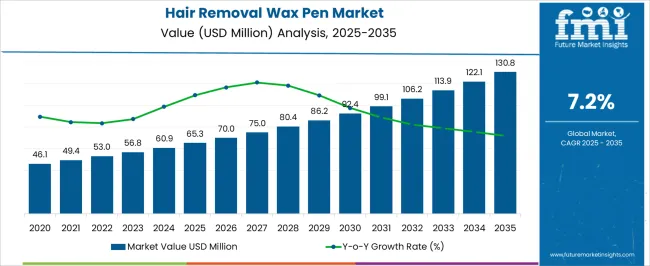
| Metric | Value |
|---|---|
| Hair Removal Wax Pen Market Estimated Value in (2025 E) | USD 65.3 million |
| Hair Removal Wax Pen Market Forecast Value in (2035 F) | USD 130.8 million |
| Forecast CAGR (2025 to 2035) | 7.2% |
The hair removal wax pen market is expanding steadily, fueled by increasing consumer demand for convenient and effective personal grooming solutions. Growing awareness around natural and skin-friendly ingredients has shifted preferences toward organic formulations that are perceived as safer and gentler.
The rise of at-home beauty treatments has encouraged product innovation focused on ease of use and portability, making wax pens popular among busy consumers. Additionally, growing sensitivity to skin health and a focus on minimizing irritation have boosted demand for products tailored to sensitive skin.
Marketing campaigns highlighting gentle but effective hair removal have resonated with a broad consumer base. The market is also being driven by increasing attention to specific grooming needs, particularly in intimate areas. As product portfolios continue to evolve with enhanced formulations and targeted applications, the market is expected to grow further. Segmental growth is likely to be led by Organic ingredients, products designed for Sensitive skin, and applications targeting the Bikini area.
The hair removal wax pen market is segmented by ingredients, skin type, application area, consumer group, end use, pricing, distribution channel, and geographic regions. By ingredients, the hair removal wax pen market is divided into Organic and Synthetic. In terms of skin type, the hair removal wax pen market is classified into Sensitive skin, Dry skin, Oily skin, and Normal skin. Based on application area, the hair removal wax pen market is segmented into the Bikini area, the Forehead, the Upper lip, the chin/jaw, the Nose, and Others (underarms, arms, etc.). By consumer group, the hair removal wax pen market is segmented into Women and Men. By end use, the hair removal wax pen market is segmented into Individual and Professional. By price, the hair removal wax pen market is segmented into Medium, Low, and High. By distribution channel, the hair removal wax pen market is segmented into Online and Offline. Regionally, the hair removal wax pen industry is classified into North America, Latin America, Western Europe, Eastern Europe, Balkan & Baltic Countries, Russia & Belarus, Central Asia, East Asia, South Asia & Pacific, and the Middle East & Africa.
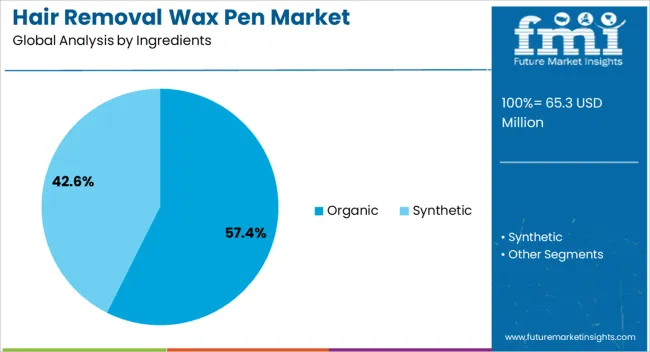
The Organic ingredients segment is expected to hold 57.4% of the hair removal wax pen market revenue in 2025, maintaining its leading position. Consumer preferences have shifted towards organic and natural ingredients due to increased awareness of chemical sensitivities and environmental concerns.
Products formulated with botanical extracts and free from synthetic additives have gained popularity for their perceived safety and moisturizing benefits. Organic wax pens are often marketed as hypoallergenic and suitable for all skin types, further boosting their adoption.
Brand messaging emphasizing clean beauty and eco-conscious choices has enhanced the appeal of this segment. With consumers seeking gentle yet effective hair removal options, the Organic ingredients segment is projected to remain dominant.
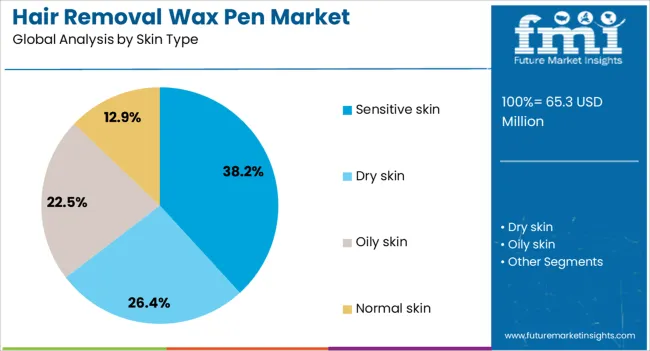
The Sensitive skin segment is projected to contribute 38.2% of the market revenue in 2025, reflecting the growing focus on products formulated to minimize irritation. Consumers with sensitive skin seek hair removal solutions that reduce redness, discomfort, and allergic reactions.
Wax pens designed with soothing ingredients and tested for dermatological safety have been favored in this segment. The rise in consumer education about skin types and personalized beauty routines has driven demand for gentle hair removal products.
Additionally, growing e-commerce penetration has made these products more accessible to consumers looking for specialized skincare solutions. The Sensitive skin segment is expected to continue growing as more consumers prioritize skin health alongside grooming efficacy.
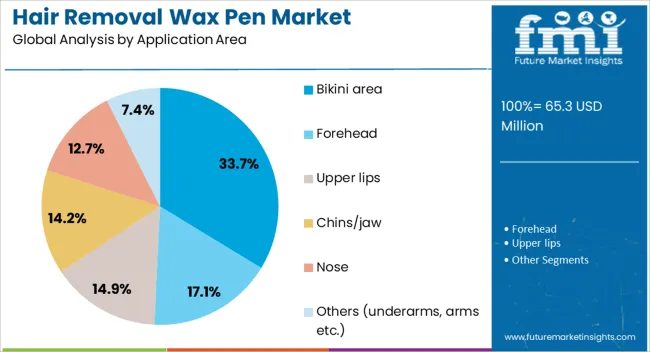
The Bikini area segment is expected to hold 33.7% of the hair removal wax pen market revenue in 2025, leading among targeted application areas. The delicate nature of the bikini area has created demand for precise and gentle hair removal methods that reduce discomfort and the risk of irritation.
Consumers have increasingly preferred wax pens for their ease of use and ability to target small areas accurately. Marketing efforts have highlighted the suitability of wax pens for intimate grooming, emphasizing hygienic and effective results.
Additionally, rising trends in body positivity and personal grooming have encouraged wider acceptance of bikini area hair removal. As consumers seek convenient and safe solutions for intimate care, the Bikini area segment is projected to maintain its leadership in the market.
Hair removal wax pens are gaining traction in home and professional grooming due to portability, precise application, and skin-friendly features. E-commerce growth, salon adoption, and product innovation continue to drive market expansion globally.
Home grooming practices have become increasingly popular, with consumers seeking convenient, cost-effective, and precise hair removal solutions. Hair removal wax pens are favored for their portability, easy handling, and minimal setup requirements, allowing users to manage grooming routines without salon visits. The segment benefits from growing awareness about personal care, online tutorials, and social media influence that encourages at-home beauty practices. Compact designs and battery-operated models further enhance adoption among busy individuals and travelers. Moreover, the availability of skin-friendly wax formulations and customizable temperature settings makes these devices suitable for diverse skin types. Increased e-commerce penetration ensures easy accessibility and competitive pricing for consumers across urban and semi-urban areas.
Hair removal wax pens are witnessing growing adoption in professional salons and small-scale beauty parlors. Their precise application and hygiene advantages make them suitable for facial areas and sensitive zones. Beauty professionals are increasingly integrating wax pens into their service offerings for clients seeking quick, efficient, and pain-minimized hair removal. Multi-cartridge options allow salons to maintain hygiene standards while serving multiple clients. Training workshops and product demonstrations by brands are enhancing professional confidence in using wax pens, helping to standardize salon practices. The cost-effectiveness, ease of replacement, and portability appeal to mobile cosmetologists, boosting the overall segment share in the professional hair removal space.
The growth of online marketplaces and direct-to-consumer channels has significantly increased hair removal wax pen accessibility. Consumers can compare brands, read reviews, and purchase devices without geographic restrictions. Retailers and brands are promoting subscription-based refills and bundled offerings, encouraging repeat purchases and brand loyalty. Promotional campaigns, influencer marketing, and seasonal discounts drive awareness and trial adoption. Offline channels, including pharmacy chains and specialty beauty stores, complement e-commerce penetration by providing hands-on experience and immediate purchase options. Distribution expansion and competitive pricing strategies enable brands to capture wider demographics, including millennials and Gen Z consumers increasingly focused on grooming and personal care at home.
Hair removal wax pen manufacturers are focusing on ergonomic designs, refillable cartridges, and skin-friendly wax formulas to enhance usability. Lightweight and compact pens reduce hand fatigue during extended grooming sessions, while temperature control mechanisms ensure safety and effective hair removal. Hypoallergenic and moisturizing wax blends cater to sensitive skin and minimize irritation. Brands are also exploring multifunctional kits combining eyebrow shaping, facial waxing, and other grooming accessories. Packaging innovations, such as reusable containers and travel-friendly designs, appeal to consumers seeking sustainability in usage. These developments position wax pens as user-friendly and versatile grooming tools, driving adoption in both home and professional settings while creating differentiation in a competitive landscape.
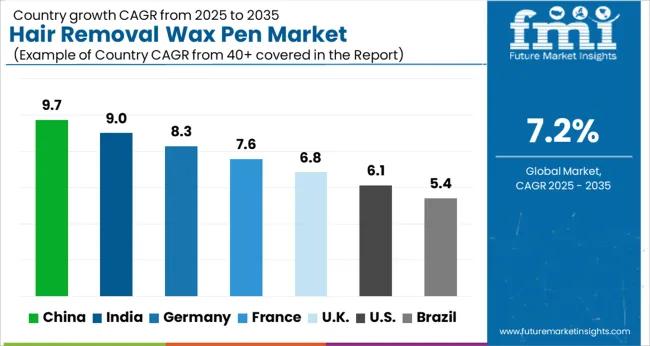
The hair removal wax pen market is projected to grow at a global CAGR of 7.2% from 2025 to 2035, fueled by rising adoption of home grooming solutions, expanding salon services, and increasing e-commerce penetration. China leads with a CAGR of 9.7%, driven by growing disposable income, preference for convenient at-home beauty solutions, and rising demand from urban salons and mobile cosmetologists. India follows at 9.0%, supported by expanding awareness of personal care, rising beauty parlors in tier-1 and tier-2 cities, and increased online sales. France grows at 7.6%, underpinned by premium grooming trends and professional salon integration. The United Kingdom achieves 6.8% growth due to strong e-commerce adoption and salon-based promotions, while the United States posts 6.1%, fueled by widespread availability through retail and online channels and preference for compact, travel-friendly designs. The report analyzes over 30 countries, highlighting these markets as key benchmarks for strategic investments, product development, and distribution expansion in the hair removal wax pen industry across home grooming, salon, and professional segments.
China was recorded to expand at nearly 9.1% CAGR between 2020–2024, later projected at 9.7% during 2025–2035, showing a sharper trajectory against the global average of 7.2%. The earlier phase was underpinned by beauty salon penetration in urban clusters, online retailing of at-home kits, and product differentiation with herbal wax blends. A stronger climb in the next period is anticipated from consumer willingness to switch from traditional methods, adoption by tier-2 and tier-3 cities, and growth of male grooming practices. Premium products such as temperature-controlled pens and refillable cartridges are becoming standard in e-commerce baskets. Domestic manufacturers are capturing mid-range categories, while imports still dominate professional-use devices. Promotional bundles with skincare add-ons and influencer tie-ups will sustain momentum, creating pricing flexibility in domestic outlets.
India was assessed to grow near 8.2% CAGR during 2020–2024, which is expected to accelerate to 9.0% from 2025–2035, surpassing the global trendline of 7.2%. Early growth came from entry-level wax pens marketed through beauty parlors, social media promotions, and bulk sales to urban retailers. The future pace is likely to benefit from middle-class expansion, more targeted marketing to younger consumers, and improved awareness in semi-urban belts. Product localization with ayurvedic wax blends and reduced pain formulations is being actively pushed by domestic brands. Professional salons are adopting temperature-sensitive pens as service differentiation tools, while price-sensitive households prefer refillable compact devices. Growth will also hinge on logistics expansion to underserved areas where beauty product penetration remains below average.
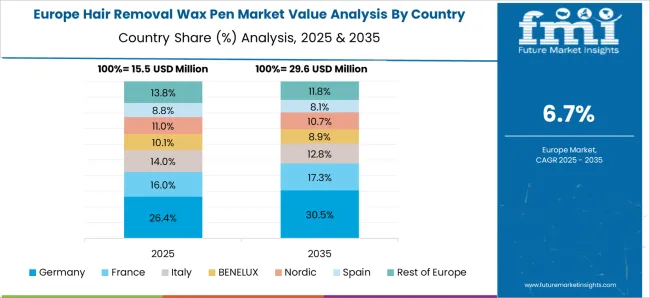
France registered a modest 6.9% CAGR between 2020–2024, but the pace is forecast to rise to 7.6% over 2025–2035, marginally above the global reference of 7.2%. Early adoption was sustained by consumer loyalty to premium hair removal brands and consistent presence of professional salon services. A higher trajectory in the coming decade is expected as at-home devices capture broader consumer bases, spurred by convenience, rising product variety, and direct-to-consumer models. Innovation in low-irritant wax formulations and refillable designs are anticipated to expand usage. Regulations for safer cosmetic formulations have also directed manufacturers toward natural and skin-friendly bases, which creates trust in premium brands. Digital marketplaces are further normalizing repeat purchases, building a more predictable sales flow across age groups.
The UK expanded at around 5.9% CAGR during 2020–2024, which is forecasted to increase to 6.8% in 2025–2035, still under the global average of 7.2% but showing stronger acceleration. Early growth was supported by awareness campaigns in metropolitan centers, multipurpose devices marketed through large retail chains, and seasonal promotions tied to grooming peaks. The climb in the next period will be driven by subscription models, eco-friendly cartridge systems, and expanded penetration through online-only beauty brands. Local consumers have shown preference for dermatologically-tested wax pens, which positions premium brands ahead of mid-tier imports. Growth acceleration also comes from inclusion in broader personal grooming kits targeted at both men and women, supported by influencer marketing that makes wax pens aspirational.
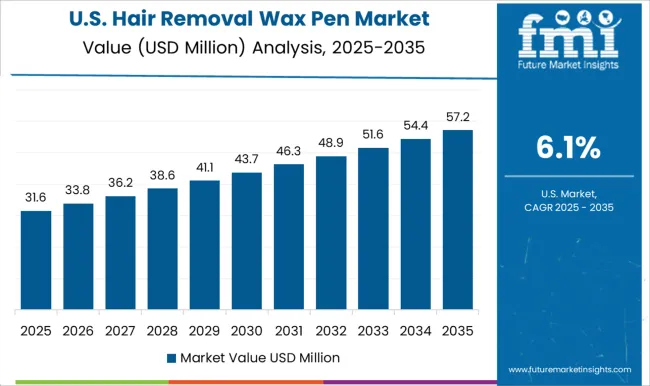
The USA recorded 5.5% CAGR across 2020–2024, now expected to move to 6.1% in 2025–2035, trailing the global 7.2% but indicating an uplift. The slower baseline was partly due to preference for alternative methods such as laser and epilation devices, limiting initial wax pen adoption. However, the forecast period is set to benefit from a resurgence in at-home grooming products, with affordability and safety playing key roles. Entry of hybrid wax pens with heating controls and hypoallergenic wax formulations is widening appeal to younger demographics. Professional salons are also beginning to add pens for quick-service offerings. Stronger growth in refillable eco-pens and multipacks will gradually lift USA CAGR, though competition from substitutes will temper volumes.
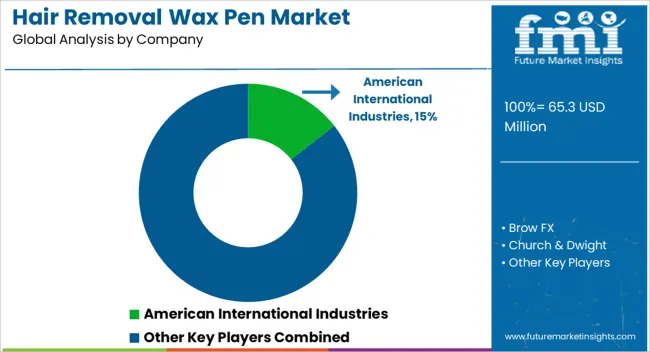
The hair removal wax pen market is shaped by a mix of global personal care conglomerates, specialist hair removal brands, and niche beauty innovators. American International Industries commands strong recognition through professional salon-grade waxing solutions distributed under multiple sub-brands. Brow FX emphasizes precision grooming tools and wax formulations aimed at shaping and defining eyebrows.
Church & Dwight leverages its broad consumer products expertise, with extensions into depilatory and hair removal lines that complement household brands. Darent Wax stands out for its specialized wax formulations that support effective and less painful removal across different skin types. GiGi maintains a dominant footprint in professional salons with its wide range of waxing systems and accessories. Harley Waxing positions itself with premium-quality waxes sourced and formulated for smoother finishes. Jax Wax and Miss Cire emphasize innovative formulations and professional-grade solutions that cater to both salons and at-home users. Parissa focuses on natural ingredient-based waxes designed for sensitive skin and environmentally conscious users.
Reckitt Benckiser leverages its mass consumer distribution networks to push brands such as Veet into global households. Sally Hansen retains a strong reputation in retail with easy-to-use wax strips and pens. Sanfe highlights women-focused grooming solutions with an emphasis on convenience and portability. SmoothSkin expands from IPL hair removal devices into complementary categories like wax pens. Wakse attracts younger consumers through visually appealing packaging and social-media-driven marketing.
Waxxxie builds consumer trust through dermatologically tested, salon-quality products tailored for sensitive regions. Key strategies across these players include introducing natural and dermatologically safe formulations, expanding distribution through e-commerce and specialty retailers, and diversifying product formats for both professional and home use. Strategic collaborations with dermatologists, influencer-driven brand promotions, and investments in portable and precision-focused devices are setting competitive benchmarks in this evolving segment.
| Item | Value |
|---|---|
| Quantitative Units | USD 65.3 Million |
| Ingredients | Organic and Synthetic |
| Skin Type | Sensitive skin, Dry skin, Oily skin, and Normal skin |
| Application Area | Bikini area, Forehead, Upper lips, Chins/jaw, Nose, and Others (underarms, arms etc.) |
| Consumer Group | Women and Men |
| End Use | Individual and Professional |
| Price | Medium, Low, and High |
| Distribution Channel | Online and Offline |
| Regions Covered | North America, Europe, Asia-Pacific, Latin America, Middle East & Africa |
| Country Covered | United States, Canada, Germany, France, United Kingdom, China, Japan, India, Brazil, South Africa |
| Key Companies Profiled | American International Industries, Brow FX, Church & Dwight, Darent Wax, GiGi, Harley Waxing, Jax Wax, Miss Cire, Parissa, Reckitt Benckiser, Sally Hansen, Sanfe, SmoothSkin, Wakse, and Waxxxie |
| Additional Attributes | Dollar sales, share, regional adoption patterns, competitive benchmarking, consumer usage behavior, pricing trends, product innovation scope, retail penetration, and growth forecasts. |
The global hair removal wax pen market is estimated to be valued at USD 65.3 million in 2025.
The market size for the hair removal wax pen market is projected to reach USD 130.8 million by 2035.
The hair removal wax pen market is expected to grow at a 7.2% CAGR between 2025 and 2035.
The key product types in hair removal wax pen market are organic and synthetic.
In terms of skin type, sensitive skin segment to command 38.2% share in the hair removal wax pen market in 2025.






Our Research Products

The "Full Research Suite" delivers actionable market intel, deep dives on markets or technologies, so clients act faster, cut risk, and unlock growth.

The Leaderboard benchmarks and ranks top vendors, classifying them as Established Leaders, Leading Challengers, or Disruptors & Challengers.

Locates where complements amplify value and substitutes erode it, forecasting net impact by horizon

We deliver granular, decision-grade intel: market sizing, 5-year forecasts, pricing, adoption, usage, revenue, and operational KPIs—plus competitor tracking, regulation, and value chains—across 60 countries broadly.

Spot the shifts before they hit your P&L. We track inflection points, adoption curves, pricing moves, and ecosystem plays to show where demand is heading, why it is changing, and what to do next across high-growth markets and disruptive tech

Real-time reads of user behavior. We track shifting priorities, perceptions of today’s and next-gen services, and provider experience, then pace how fast tech moves from trial to adoption, blending buyer, consumer, and channel inputs with social signals (#WhySwitch, #UX).

Partner with our analyst team to build a custom report designed around your business priorities. From analysing market trends to assessing competitors or crafting bespoke datasets, we tailor insights to your needs.
Supplier Intelligence
Discovery & Profiling
Capacity & Footprint
Performance & Risk
Compliance & Governance
Commercial Readiness
Who Supplies Whom
Scorecards & Shortlists
Playbooks & Docs
Category Intelligence
Definition & Scope
Demand & Use Cases
Cost Drivers
Market Structure
Supply Chain Map
Trade & Policy
Operating Norms
Deliverables
Buyer Intelligence
Account Basics
Spend & Scope
Procurement Model
Vendor Requirements
Terms & Policies
Entry Strategy
Pain Points & Triggers
Outputs
Pricing Analysis
Benchmarks
Trends
Should-Cost
Indexation
Landed Cost
Commercial Terms
Deliverables
Brand Analysis
Positioning & Value Prop
Share & Presence
Customer Evidence
Go-to-Market
Digital & Reputation
Compliance & Trust
KPIs & Gaps
Outputs
Full Research Suite comprises of:
Market outlook & trends analysis
Interviews & case studies
Strategic recommendations
Vendor profiles & capabilities analysis
5-year forecasts
8 regions and 60+ country-level data splits
Market segment data splits
12 months of continuous data updates
DELIVERED AS:
PDF EXCEL ONLINE
Hair Removal Spray Market
Earwax Removal Market Analysis by Product, Age Group, Distribution Channel, and Region Forecast Through 2035
Ear Wax Removal Products Market Size and Share Forecast Outlook 2025 to 2035
Laser Hair Removal Devices Market Analysis - Growth & Forecast 2025 to 2035
Depilatory Hair Removal Creams Market Analysis - Size and Share Forecast Outlook 2025 to 2035
Cosmetic Ingredients For Hair Removal Market Size and Share Forecast Outlook 2025 to 2035
Waxed Paper Market Size and Share Market Forecast and Outlook 2025 to 2035
Hair Mineral Analyzer Market Size and Share Forecast Outlook 2025 to 2035
Waxing Base Paper Market Size and Share Forecast Outlook 2025 to 2035
Hair Regrowth Treatments Market Size and Share Forecast Outlook 2025 to 2035
Hair Growth Promoters / Anti-Hair Loss Agents Market Size and Share Forecast Outlook 2025 to 2035
Wax Injector Market Size and Share Forecast Outlook 2025 to 2035
Hair Extension Market Size and Share Forecast Outlook 2025 to 2035
Hair Bond Multiplier Market Size and Share Forecast Outlook 2025 to 2035
Hair Loss Prevention Products Market Size and Share Forecast Outlook 2025 to 2035
Hair Thinning Solutions Market Analysis - Size and Share Forecast Outlook 2025 to 2035
Hair Growth Serums Market Analysis - Size and Share Forecast Outlook 2025 to 2035
Hair Finishing Stick Market Size and Share Forecast Outlook 2025 to 2035
Pentane Market Size and Share Forecast Outlook 2025 to 2035
Penile Cancer Treatment Market Size and Share Forecast Outlook 2025 to 2035

Thank you!
You will receive an email from our Business Development Manager. Please be sure to check your SPAM/JUNK folder too.
Chat With
MaRIA